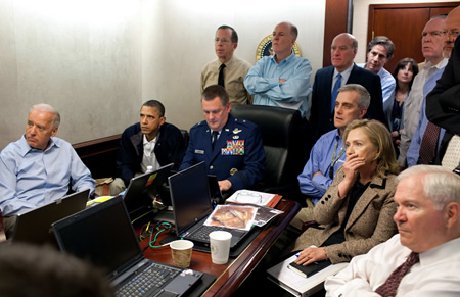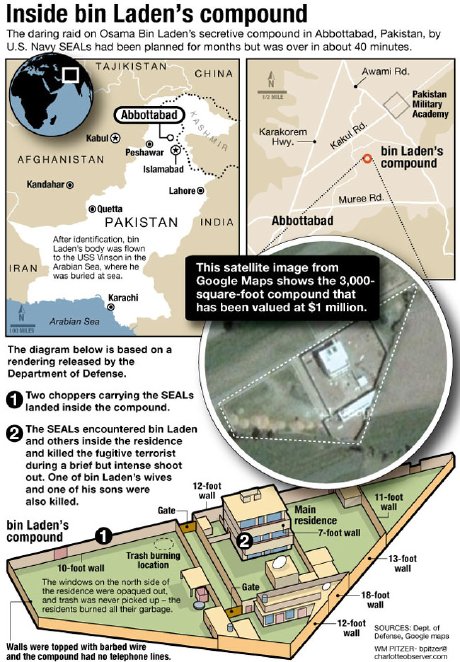Adil Najam
What do Pakistanis think about how Osama Bin Laden met his end, the implications of that end?
There are as many opinions on what happened in Abbottabad as there are Pakistanis. Maybe more. But there is no sense whatsoever where the government of Pakistan (or any of its major institutions) stand on what happened – or stood when it was happening. For 36 hours now the world has been waiting to see what Pakistan does and says – the silence and incoherence from Islamabad has not just been embarrassing, it has been damning. Finally, key institutions in Pakistan have begun trying to piece a narrative together – unfortunately it is way too late and the narrative itself rather lame.
When I put up a short post on Osama Bin Laden’s death soon after the news broke, I had hoped that in time more details would become available and we would get more clarity on what happened and how. We do now have more detail. But certainly not more clarity. The story about what happened in Abbottabad now lives in Spin-abad. Everyone – from governments, secret agencies, the media, the Twitterati, and your spinster aunt – are taking a spin. Many are taking multiple, sometimes contradictory, spins. Everyone except the Pakistan government.
That, of course, is a surprise – not only because the Pakistan government does have a lot of explaining to do, but even more because it is in the interest of the Pakistan government to do that explaining itself rather than have someone else do it for them. Yet, up until it was already too late, Pakistan seems to have abdicated that responsibility. In fact, President Barack Obama, Secretary Hillary Clinton and Senator John Kerry seemed to be making that (half-hearted) case for Pakistan more than anyone in authority in Pakistan. Given that President Obama had informed President Zardari before the speech from the US President, one would have assumed that the Pakistan President and his media handlers would have their own statement ready to go on the air minutes, if not seconds, after President Obama’s speech. This is not about spin and PR, this is Diplomacy 101: Own and define the narrative as soon and as clearly as you can before someone else defines it for you – especially if the narrative is likely to be unfavorable.
But the narrative, itself, is not the core of Pakistan’s challenges. The problem is the facts on the ground and the government’s inability and unwillingness to explain them. Pakistan is used to the feeling of the world ganging up on it. But there are good reasons for the questions being asked of Pakistan by the world today. There are even better reasons for the questions being asked of Pakistan by Pakistanis today. Whether the government comes clean to the world or not, it is vital that it respond to Pakistanis. The first is a matter of national image (no trivial issue, that), but the latter is a question of citizen trust in national institutions (an existential element of statehood).
The fact is that there is a Pakistan case to be made on this issue. And it needs to be made to Pakistanis much more than to the rest of the world. It is a case that forcefully stresses that a world, and a Pakistan, without Osama Bin Laden in it is a vastly better world than one with him in it – this is a villain who orchestrated events that have left more than 30,000 Pakistanis dead in extremism and terrorism. It is a case that legitimately highlights the sacrifices that Pakistan and Pakistanis have, in fact, made in the fight against terrorism. Most importantly, it is a case that honestly analyzes what happened in Abbottabad – it is not a surprise that Osama Bin Laden was found in Pakistan and in a large urban area (just like nearly every other major Al Qaida figure captured) – but an explanation is owed on why Pakistani intelligence failed to make the connections that led to him, an explanation is owed on exactly what Pakistan’s official role in the final operation was (or was not), and an explanation is owed on exactly what Pakistan’s strategy on countering terrorism is, who is running it, and why it is not working well enough or fast enough.
In a country and an ‘establishment’ as divided as Pakistan, this cannot be an easy conversation; it is not supposed to be. It is time to ask honest and tough questions of everyone. It has long need a necessary conversation; now is the time to have it.





















































Meengla,
I missed another thing – who is playing war drums? Nobody in their right minds wants a war. All that the world needs is some acceptance of the truth, and course correction for the future. By Pakistan, after realizing that such course correction is in its own long term interests, which I truly believe it is.
As to the 1998 tip off to OBL when Clinton attacked the camps in Afghanistan, it is part of well-established fact by now. Even informed Pakistanis don’t deny it – the only point of speculation is what level of the ISI the tipoffs originated from. The same with the escape of OBL at Tora Bora.
And by the way (since you mention it), it is now reasonably well known that the ISI chief (was it Gen Mahmud Hasan – I forget now) who is supposed to have travelled to Afghanistan asking the Taliban to hand over OBL in reality went to egg them on in their fight. This was the general removed from his post as DG-ISI under US pressure just before the US invasion of Afghanistan began. You could look up further accounts of his direct involvement with OBL and AQ almost until the eve of the US invasion of Afghanistan – I will not spend time on it here. Until the Taliban was dislodged, there was heavy presence of Pakistani military officials inside Afghanistan, serving as military advisers to the Taliban. Given the close involvement of the Al Qaeda with the Taliban, one doesn’t need to be too imaginative to see the links between the Pakistan military and Al Qaeda. The Kunduz airlift was meant to extricate these personnel – which is why the US looked away in order to not embarrass Pakistan.
Good to see a couple of regular and so-called sympathetic Indian readers being exposed. Every country has to protect its own interests and nothing is black and white in this world. Is America a clean country? Far from it. It has the blood of millions on its hands. And Pakistan has every right to protect its interests. The only problem is that some generals are so coward and self-centered that they don’t care about strategic interests and this creates problems for Pakistan.
Everyone knows that India is playing a dirty game in Afghanistan and interfering in Balochistan. India has no lingual, geographical, cultural, religious, or ethnic ties to Afghanistan. More than half of Afghans are Pashtuns and Pakistan shares a long border with them besides having our own large Pashtun community. We have every right to protect our interests in Afghanistan. Every country does that and the s0-called upright people are either fools or are trying to hoodwink others.
There are also more than one million Persian/Dari speakers in Pakistan, more than one-third of them being Pakistani nationals while the rest refugees. Pakistan and Afghanistan are inseparable. Unfortunately, some goons in Afghan government are harping on Indian string. Little do they know that it is Pakistan that provides the majority of Afghans sustenance. No country in the world has played host to 3 million refugees for 32 years. These refugees refuse to leave Pakistan. Some do under pressure from UNDP but return after a few months. The border is porous and will always remain one because of ethnic, lingual, and religious ties.
It is high time that patriotic top brass of Pakistani establishment exposes the black sheep and take a tough stand. Americans can be reined in very easily and Indians have no place in Afghanistan in the first place. And we have to adopt a policy for Kashmir. I have no objections on Kashmiris gaining independence. They also want it as they are victims of decades of brutal repression and genocide at the hands of Indians.
Only if some sane persons in the Pakistani establishment open their eyes and make sensible policies. We also need to re-engage with China. It is about time to turn this shameful episode into an opportunity. There will be many troubles if they miss this golden chance.
Oh, I didn’t respond to one thing in your post. The WOT has certainly been a net loss for Pakistan – I have no argument with that. But your assumption is that I was referring to gains for “Pakistan” when talking about Osama being the goose that laid the golden eggs. To the contrary, if you read what I wrote, I was referring to the fact that it was profitable for the Pakistan army and for individuals in it. One could even argue that gains to the army (and military more generally) have been negative as well, but what matters is whether those in control thought they were gains or not. In sum, what matters is not the reality of the gains and/or losses, but what those in decision making positions on these issues “thought” were gains.
Let’s leave it for history to decide whose “theories are bogus” as you put it. I only know that things I have been stating for years based on available evidence (and I am by no means alone in holding those views), and that people like you have denied, have come out to be largely true one by one. For years, there was complete denial that Pakistan was even involved with the anti-India terrorists. That has changed over time. The trial underway in the American courts of Rana and the plea bargain deal of Headley will further expose the direct complicity of the Pakistan state and its agencies in the 2010 Mumbai attacks over the next few weeks. And that will become part of accepted reality too. Similarly, the complicity with the Al Qaeda is already part of accepted reality, not media speculation as you put it, and will become even clearer over time. So let’s return here in a few years and see whose theories are bogus.
@Sridhar,
Your thesis is still bogus if you think OBL was the goose which laid golden eggs for Pakistan. Someone more informed than me can come here and give you and the world a documented account of the fact that ‘despite the billions’ ‘given’ to Pakistan the WOT is a netloss for Pakistan in every single way possible. And in 1998–when supposedly official Pakistan had ‘tipped off’ OBL–Pakistan was under American sanctions. So much for the goose!
You see: When you start with theories built-upon media speculation, even discounting the recent supportive statements by Kerry, Clinton, and Obama himself in Pakistan’s role–so you ARE going to pick up what you want to pick up. And you picked up Panetta instead of Clinton.
Anyway, yes, I am not going to deny that Pakistan keeps its ‘assets’ in place to ‘bleed’ India anyway but Americans are an entirely different thing. Perhaps you will even deny efforts by Pakistan BEFORE 9/11 to press the Taliban retards to hand-over OBL to America.
There have been plenty of intelligence failures in the history before and there will be more–not just in Pakistan. But you don’t go around starting war drums based on that.